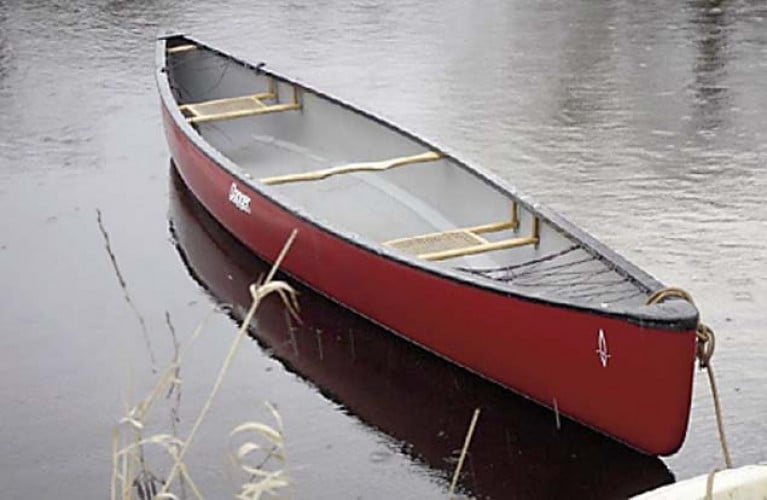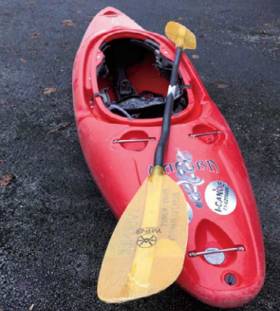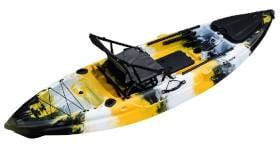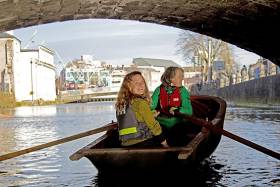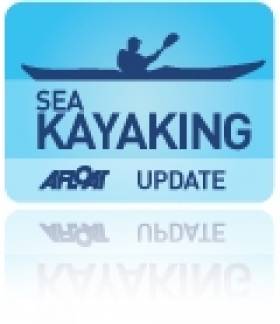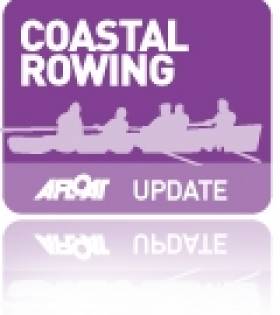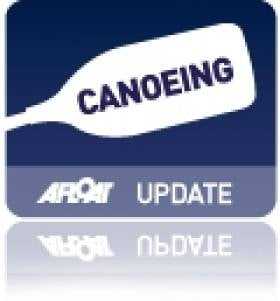Displaying items by tag: kayak
€170k for Upgrade of National Canoe Training Centre at River Liffey's Strawberry Beds
€173,474 has been granted to the Irish Canoe Unionin the latest Sports Capital and Equipment Programme Capital Allocations for upgrades to its national training centre on the River Liffey at Strawberry Beds, Lucan in County Dublin.
Canoeing Ireland's Training Centre is a purpose-built centre which offers a range of paddling courses catering for the complete beginner and also for those who wish to progress their skills to intermediate and advanced levels. It offers a range of skills courses and paddling opportunities for both young people and adults.
Sailing and rowing also benefitted in the latest funding awards as Afloat reported previously.
Minister Martin announced an overall package of €150 million in new capital grants under the latest round of the Sports Capital and Equipment Programme (SCEP) on Friday, February 11th.
€144 million is allocated to almost 1,900 applications with €6 million kept in reserve for successful appeals lodged by unsuccessful applicants.
More here
'Lost' Kayak Sparks Belfast Coastguard Search
In early June, an inflatable kayak that had been seen washed onto rocks at Orlock near Groomsport on the North Down coast sparked a full search of the area by Bangor Coastguard Rescue Team, Portaferry CRT, the Donaghadee Saxon Lifeboat and the Bangor B Class Atlantic 8 Lifeboat.
The kayak was in very good condition and had not been there for long. On arrival at the location, the team took photographs and sent them to Belfast Coastguard after which a full search was requested.
Belfast Coastguard also made a Facebook appeal for the owner and as the search unfolded the owner was located safe and well. The kayak had been lost earlier in the evening due to an incident, but no one was injured.
The team took the kayak back to the car park for collection by the owner who was given advice. Bangor CRT emphasises, " If you lose an object in or near the sea report it to the Coastguard. Thanks to the members of the public that rang 999".
Kayaker Who Died on Lough Gill Had Been Separated from Canadian Canoe in Bad Weather, MCIB Report Finds
A lone kayaker who died on Sligo’s Lough Gill last year may have become separated from his Canadian canoe in bad weather, an investigation has found.
A Marine Casualty Investigation Board (MCIB) report into the incident on January 29th, 2019, has found that wellington boots worn by the kayaker would have weighed him down on immersion.
The incident is believed to have occurred sometime between 18.27 hours on January 26th and the next evening, January 27th, before darkness fell.
The man had set out from a pier in Trawane Bay opposite Inishfree on the southwestern corner of Lough Gill and planned to camp overnight near Slish woods.
His body was found by Sligo-based Irish Coast Guard helicopter about 0.75 km from his campsite on the morning of January 29th, after the alarm was raised by his partner.
His canoe was found later on the shore by his partner approximately 0.4 km east of the campsite which he had established.
Weather conditions were not suitable for a small craft, and the personal flotation device (PFD) worn was designed to aid a person to stay afloat and swim to safety.
“The PFD would not keep him afloat as an inflatable life jacket would have done,” the report states.
The report says the canoe and the casualty “were found in two different locations indicating that the casualty entered the water and became separated from the canoe due to some incident”.
“There were no grab lines attached to the canoe to assist recovery,” it says.
The kayaker had a mobile phone but did not carry any other means of signalling for help, such as flares or a marine VHF handheld transceiver, the report states.
The report notes the man’s partner advised that he had bought the canoe within the past 12 months, and was inexperienced in using this type of craft or any craft on the water.
“He was, however, a competent swimmer having gained several certificates for achievements in swimming,” the report states.
An autopsy recorded cause of death as freshwater drowning.
The MCIB report recommends that a marine notice should be issued, highlighting the requirements set out in Chapter 7 of the Code of Practice for Recreational Craft for canoeing/kayaking.
It says particular attention should be paid to the code’s section 7.1 on training, 7.2 on carrying a mobile phone or marine VHF radio in a suitable watertight cover, and that the hull is fitted with grab loops/towing lines, and that the person is a competent swimmer.
It also recommends that canoeists/kayakers should “ensure that they wear clothing and footwear that will not affect their chance of survival in the water”.
Lack of Communication Delayed Alerting Emergency Services When Kayaker Trapped in Kerry River, MCIB Report States
An inquiry into the death of an experienced kayaker on a Kerry river last year has found that the lack of communication at the scene delayed call to the emergency services writes Lorna Siggins
Brita Waters (36) from Baldoyle, Dublin, drowned after she became trapped under a log on the Roughty river in Kilgarvan on November 4th, 2018.
The Marine Casualty Investigation Board (MCIB) report says that not all of the requirements of a code of practice for recreational craft were adhered to, including carrying personal locator beacons (PLBs) on remote rivers with grade 3 or “difficult” conditions.
The one mobile phone with the group was in the pocket of Ms Water’s lifejacket.
It says that a lack of any other mobile phone or other means of contact at the scene of the incident resulted in a 37-minute delay in calling the emergency services.
Ms Waters, who lived in Douglas, Cork, but had family connections with Baldoyle in Dublin and Dungarvan, Co Waterford, was a social studies graduate who had worked with Tusla, the child and family agency.
She was a highly experienced member of the Lir Canoe Club and had provided training and safety cover for fellow kayakers on events such as the Liffey Descent.
She had volunteered abroad and at home with Alone, the charity for vulnerable older people, and with Make-A-Wish, which organises events for children and teenagers with life-threatening medical conditions.
The incident occurred when Ms Waters was one of a group of five from her club, navigating the Roughty, a 30km river running via Kilgarvan, Co Kerry, into Kenmare Bay.
The MCIB report confirms that all of the group were adequately trained and experienced, and the group was familiar with the river, which is classed as 3-4 white water grading, suitable for mixed ability groups.
They had inspected the river and were aware of a log obstruction on the route, but had planned to exit before this.
Ms Waters had started to turn into a side channel when her kayak was capsized by an underwater rock. She slipped out and was unable to grab the handles of the kayak or get onto her feet.
“She was washed quickly downriver over the drop obstructed by a large log and was trapped by the water flow under the log. The distance between the point of capsize and the drop was between five and six meters,” the report states.
Had the log not caught the casualty, and the water flow around it pushed her down, she would have arrived safely at the pool below the drop,” the MCIB report states.
The report says all four kayakers tried to pull her free, but the water flow was pushing her down. They tied ropes to try and keep her head above water, and tried to move the log but were unable to do so.
After about 20 minutes, one of the group went up to the road about 200 metres away and called the emergency services with a passer-by’s phone. The Kenmare Fire Brigade was first on the scene, followed by the Garda.
Rescue efforts focused on trying to move the log, which took just over an hour, but it was then found that Ms Waters was being trapped by a second more dangerous log with branches underneath.
Her buoyancy vest was cut away and she was released at 13.55 hours. She was pronounced dead by a doctor attending with the ambulance service after she was brought ashore.
A post mortem concluded death was caused by acute cardio-respiratory failure due to drowning.
The MCIB report says that “kayaking groups making descents on remote rivers of Grade 3 and higher should carry registered PLBs”.
It recommends that the requirements set out in Chapter 7 of the code of practice for recreational craft for canoeing/kayaking “should be highlighted by means of a Marine Notice”.
Big Kayak Selection Arrives at O’Sullivan’s Marine
After launching a comprehensive new range of Cool Kayaks earlier in the season, the demand was so high that stocks soon ran out… not surprising considering their high quality and exceptionally good prices writes Brian O'Sullivan of O'Sullivan's Marine.
The good news is that a new consignment arrived into O’Sullivan’s Marine on 6th August, and the even better news is that they have increased their range, and can now offer an even bigger selection of “best value” kayaks in Ireland!
Sit On Top Kayaks
Sit on top kayaks are getting increasingly more popular, and at O’Sullivan’s Marine they have models to suit all budgets and abilities.
Recreational Fun for all the family
From the low profile sleek Flash Kayak for small adults and children up to the 9’6” Conger single kayaks and several models in between, O’Sullivan’s Marine can offer a range to suit all individual kayakers.
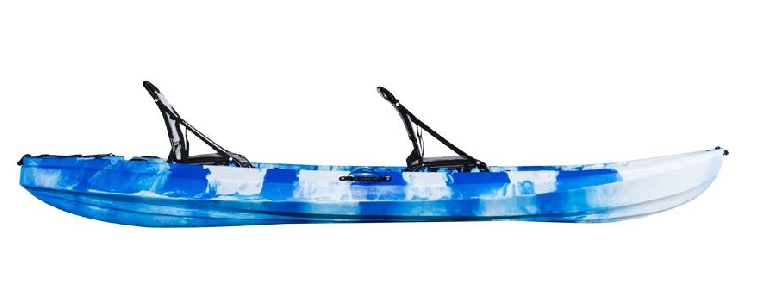 Oceanus 5
Oceanus 5
For those who want to share the fun, they also offer the Glide 1 + 1, this stable versatile platform has room to bring a small passenger in front of the paddler or the Oceanus 2.5 seater, a well-priced tandem kayak.
Angling Kayaks
Using kayaks for angling is a rapidly growing pastime that has many advantages for fishermen and women. It allows the exploration of areas that would otherwise be difficult to access, giving more fishing time and potentially bigger catches!
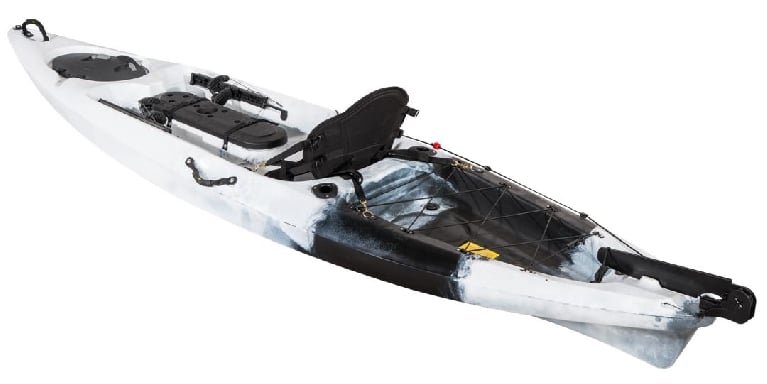 The Dace Pro 8
The Dace Pro 8
O’Sullivan’s Marine has a comprehensive choice of models for the angler, fully equipped with everything needed for a comfortable and productive outing. Ranging from the 9’6” Rodster up to the Dace Pro Angler 14’ single kayak, and the Caster double seater, these kayaks are well-featured and offer the perfect combination of stability, speed, manoeuvrability and straight-line tracking.
Tarpon Propel Kayak
Packed to the gills with fishing features, the Tarpon Propel 10 pedal kayak is equipped with a performance-engineered pedal drive system for hands-free fishing, accessory gear tracks, adjustable seat, hand-controlled rudder and 2 flush mount rod holders. Coming in at 10.5’ long and 33 inches wide this fishing machine is ready for anything!
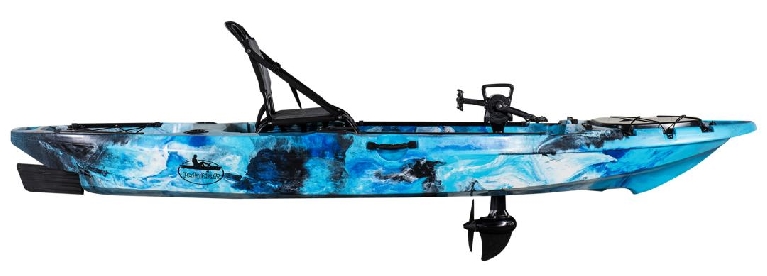 Tarpon
Tarpon
Touring Sit in Kayak
The Swift touring kayak has a unique design that cuts through the water easily, giving it extraordinary acceleration. Equipped with a large seat well and two storage hatches.
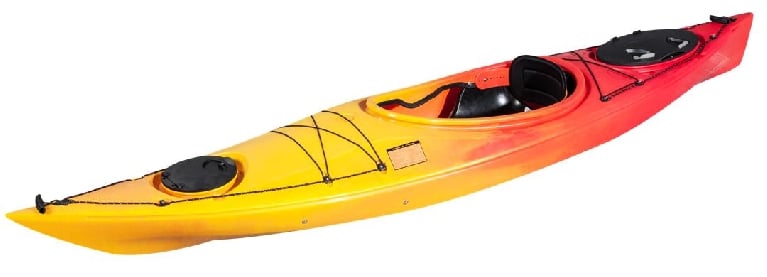 Swift 3
Swift 3
SUP Boards
Available in 10’ and 12’, the cool SUP boards are high quality, competitively priced and equipped with storage hatches, foot cushions, bungees, drain plugs and carrying handles.
All Cool kayaks are well equipped as standard, but also offer a full range of additional accessories, from roof racks to luxury seats, all available from next week at O’Sullivan’s Marine.
For more information contact 066 7124524 or visit www.osmarine.ie
A unique new tidal guide assisting river users to circumnavigate the city’s waterways was launched yesterday at the River Lee Hotel. CORKUMNAVIGATION is a pocket-sized map published by Cork’s community boatyard, Meitheal Mara. The guide is aimed at helping locals and visitors alike discover the city from a new angle by kayak, canoe or rowing boat. See link below to purchase the guide.
According to Cathy Buchanan of Meitheal Mara, ''very few people know that you can actually row or paddle all around the city, and experience a very different and special side of Cork. As several of the bridges are particularly low and some weirs quite high, they can only be passed at certain tides. With the CORKUMNAVIGATION guide you can successfully navigate the city’s 29 bridges and eight weirs at various stages of the tide.''
Niamh Twomey, Cork City Council Heritage Officer, added ''The River Lee is one of the great unexploited spaces in Cork, offering a beautiful route around the historic city centre. This guide will give the growing number of river users the opportunity to experience the natural and built heritage of Cork from the River Lee. The guide also includes quirky historical facts contributed by the late Cían Ó Sé.''
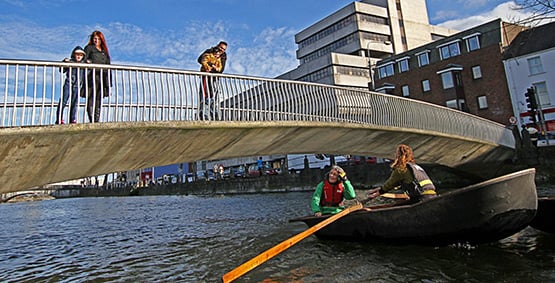
Corkumnavigate Cork city's 29 bridges and eight weirs with this latest pocket guide.
Originating near Gougane Barra in the Shehy Mountains, the River Lee flows east towards Cork City where it splits into two channels, forming the city's central island. Medieval Cork was a network of small river channels, which over the centuries have been covered in to leave just the north and south channels open. The river derives its name from the Irish "Laoi", meaning torrent or flood.
CORKUMNAVIGATION is a Meitheal Mara project, sponsored by Cork City Council and the River Lee Hotel. Fieldwork for the project was conducted in 2010 by the Cork Centre for Architectural Education, UCC and CIT, and sponsored by the Heritage Council.
The CORKUMNAVIGATION guide is available from Meitheal Mara via Afloat's Marine Market. Click HERE.
Coastguard Coordinating Search for Overdue Kayaker
HM Coastguard is coordinating a search for an overdue kayaker. The Kayaker left from Portmuck, County Antrim, Northern Ireland and has not returned as expected.
The Kayaker was reported overdue to the Coastguard just before 19:00 last night by a concerned friend.
The Royal Navy Rescue helicopter based at Prestwick, Irish coast guard rescue helicopter based at Dublin, the police helicopter, lifeboats from Redbay, Donaghadee, Bangor and the all-weather and inshore lifeboats from Larne, along with Coastguard Rescue Teams from Port Muck, Larne and Bangor are involved in the search.
Dawn Petrie, UK Coastguard said:
“The kayker was reported overdue after not returning home this afternoon, we are carrying out an extensive search in the Gobbins coastal path area of Portmuck. Rescue resources were quickly sent to the area and we are also asking vessels in the area to help”
RNLI adds:
A massive search and rescue operation from Belfast Lough to Fairhead in County Antrim, involving four RNLI lifeboats has resumed this morning (Tuesday 29 September) in a bid to find a kayaker missing from yesterday afternoon.
Volunteer lifeboat crew from Larne, Red Bay, Bangor and Donaghadee RNLI searched for the missing man throughout the early hours, stopping at 3.30am for a short rest and to allow lifeboats to refuel.
Despite the darkness, weather conditions for searching were described as good during the night with clear visibility.
This morning, Larne RNLI’s all-weather and inshore lifeboats and Red Bay RNLI’s inshore lifeboat launched once again while Campletown RNLI in Scotland also joined the search. The operation is being coordinated by Belfast Coastguard.
Larne RNLI was first requested to launch at 7.30pm yesterday evening following a report of a missing kayaker who had set sail from Portmuck at Islandmagee at 1.30pm. The kayaker was due to return to shore at 3pm.
Larne RNLI’s all-weather and inshore lifeboats were initially launched to search from Portmuck to Whitehead before moving to search the area of Gobbins Path. Red Bay RNLI meanwhile was diverted while on a training exercise and requested to go southwards towards Larne. Later at 9.30pm, the search was extended and both the inshore lifeboat from Bangor and the all-weather lifeboat from Donaghadee launched. Bangor RNLI initially searched the Groomsport area before moving across back up into Belfast Lough while Donaghadee searched the Copelands area.
As the search got underway once again this morning, Darren Byers, RNLI Divisional Operations Manager said: ‘Our volunteers have had a short break to rest and refuel their lifeboats but are now back out and will be making every attempt this morning to find the missing kayaker and bring him home. Our thoughts and prayers are very much with the man and his family at this time.’
26 Canoeists Rescued From River Foyle
#foylerescue – A group of canoeiests are safe after capsizing on the river Foyle this afternoon and sparking a major resuce operation. At 2.05pm Belfast Coastguard was alerted by Police Service Northern Ireland, (PSNI) to an incident in the River Foyle involving two large capsized canoes with 26 people in the water.
Coleraine Coastguard Rescue Team was sent to the area and the Coastguard requested lifeboats from Foyle Search & Rescue, the Irish Coastguard rescue helicopter and Irish Coastguard boat from Greencastle. Northern Ireland Fire & Rescue Service also joined the search and rescue operation.
Lifeboats recovered 26 adults from the water and 12 people were transferred to hospital by helicopter and also by Northern Ireland Ambulance Service to be checked for hypothermia.
The group of 26 adults had got into difficulty after their two large canoes capsized.
The canoeists were taking part in a fundraiser for the YMCA. All 26 are now at Altnagelvin hospital with mild hypothermia, it has been reported.
The Coastguard recommends:
Safety Advice for Sea canoeing / kayaking: Ensure that someone at home knows your passage plan including points of arrival and departure, timescale, number in group and other relevant information. Check weather forecasts and tidal conditions and ensure that your skill levels are appropriate for where you are kayaking. Wear a buoyancy aid and check that equipment is functioning properly, that your distress flares are in date and are stowed where you can reach them. Carriage of a 406 Personal Locator Beacon is highly recommended for more remote locations.
Carry a VHF marine band radio (fitted with DSC if possible) and learn how to use it. Where there is good network coverage then it is worth carrying a mobile phone in a waterproof bag. Call the Coastguard if you get into difficulty, preferably via channel 16 on your radio or if not by calling 999 and asking for the Coastguard.
2015 Ocean to City – An Rás Mór Prizewinners
#oceantocity – Cork harbour waters featured a flotilla of over 180 Irish and international boats taking part in the Ocean to City, An Rás Mór on Saturday. A record number of boats competed in the race which saw competitors row 28km from Crosshaven's Royal Cork Yacht Club to Lapps Quay.
Blackrock Youth Course
1st Lassies Crew Tara & Pamela, The Pink Pirates, YAP Ireland
1st Lads Crew Adam & Jake, Mooju, TACT Project, Togher
1st Youth Crew William & Charlie, The Red Oars, Life Centre
1st Junior Kayak Daniel Redmond, Phoenix Kayak Club
1st Cooperation Ireland Crew David & Jack, Belfast/Lisburn
Ogra Cup Winner Mikey & Niall, The Daisy, Foroige Greenmount/Ballyphehane
Most Fiercesome Youth Crew Jack, Ciaran & Cliona, Belfast/ Lisburn Cooperation Ireland
Monkstown-Kayak Course
1st Woman Kayak #770 Catherine Molloy
3rd Veteran Kayak #753 Barry Marron, Inniscara Sailing & Kayaking Club
2nd Veteran Kayak #766 Sean Casey
1st Veteran Kayak #773 Patrick Sparrow
2nd Single Sit-on-top Kayak #753 Barry Marron, Inniscara Sailing & Kayaking Club
1st Single Sit-on-top Kayak #669 Chris Coady
3rd Single Touring Kayak #770 Catherine Molloy
2nd Single Touring Kayak #766 Sean Casey
1st Single Touring Kayak #773 Patrick Sparrow
Monkstown Course
1st 2-hand Currach #105 Churchfield Community Trust, An Dobharchú
Dragon Boat Course
2nd Dragon Boat #83 Dublin Vikings
1st Dragon Boat #84 Croí Cróga
City-Kayak Course
3rd Veteran Kayak #679 Lawrence Buckley, Blackrock Surfski Club
2nd Veteran Kayak #675 Tim Healy
1st Veteran Kayak #682 Malcolm Banks, Salmon Leap
1st Veteran Woman Kayak #648 Jan Albin, Snowdonia Canoe Club (Wales)
2nd Woman Kayak #606 Ruth McAuliffe, Phoenix Kayak Club
1st Woman Kayak #648 Jan Albin, Snowdonia Canoe Club (Wales)
1st Double Kayak #509 Patrick Pierce & Ruth Phelan
3rd Touring Kayak #654 Chris McDaid, North Mayo Sea Kayakers
2nd Touring Kayak #672 Edward Doody
1st Touring Kayak #675 Tim Healy
2nd Racing Kayak #679 Lawrence Buckley, Blackrock Surfski Club
1st Racing Kayak #682 Malcolm Banks, Salmon Leap
1st Single Kayak #682 Malcolm Banks, Salmon Leap
City Course
1st Veteran Crew #17 North Berwick Rowing Club, Speedwell (Scotland)
1st City Crew #17 North Berwick Rowing Club, Speedwell (Scotland)
Ocean-Relay Course
1st Traditional-style Relay Crew #2 Kilbrin Rowing Club, Cul Rowings
1st Relay Crew #59 Galley Flash Rowing Club
1st ICRF Relay #59 Galley Flash Rowing Club
Ocean Course
2nd Mixed Crew #39 North Berwick Rowing Club, Bass Rockets (Scotland)
1st Mixed Crew #62 Edermine Ferry, Still Mad For It
1st Veteran Crew #7 Naomhóga Chorcaí, Croi Na Nog
3rd Women's Crew #51 MYC Rowing Porthmadog, Porthmadog Ladies (Wales)
2nd Women's Crew #20 St.Kearns Rowing Club, Flaming Rowing Tigers
1st Women's Crew #8 Naomhóga Chorcaí, Neart na mBan
1st Single Sliding Seat Boat #13 Mersea Island Rowing Club, Lone Wolf (England)
2nd St Ayles Skiff #39 North Berwick Rowing Club, Bass Rockets (Scotland)
1st St Ayles Skiff #38 Coigach Rowing, Coigach (Wales)
1st 4-oared Wooden Boat #20 St.Kearns Rowing Club, Flaming Rowing Tigers
1st 6-oared Wooden Boat #72 Falmouth Gig Club, Kernow Bys Vyken (England)
1st Wooden Boat #38 Coigach Rowing, Coigach (Wales)
1st Mixed Crew Celtic Longboat #54 Aberystwyth RC, Aberystwyth Mixed (Wales)
2nd Celtic Longboat #52 Aberystwyth RC, Aberystwyth Men (Wales)
1st Celtic Longboat #53 Aberystwyth RC, Aberystwyth Vets (Wales)
2nd ICRF #68 Templenoe Rowing Club
1st ICRF #63 Arklow Rowing Club, Honey Badgers
1st GRP Crew #63 Arklow Rowing Club, Honey Badgers
2nd Racing Currach #29 An Spideil
1st Racing Currach #30 Doonbeg Currach Club
1st Working Noamhóg #7 Naomhóga Chorcaí, Croi Na Nog
1st Currach #3 Naomhóga Chorcaí, Fiolair na Mara
1st Ocean Crew #3 Naomhóga Chorcaí, Fiolair na Mara
Special Awards
Meitheal Mara Challenge #105 Churchfield Community Trust, An Dobharchú
Boat of the Day, Charlie Hennessy Cup #4 Avonmore II, Paul Tingle
Boat Builder of the Day #33 Jeremy Duffin, Strangfjǫrðr, Strangford Costal Rowing Club
Community Boat Build Prize #1&2 Kilbrin Rowing Club
First International Crew #53 Aberystwyth RC, Aberystwyth Vets (Wales)
Special Endeavour Award #754 Jason Coniry for the ''First ever SUP entry''
Cian Ó Sé Commemorative Trophy #11 Naomhóga Chorcaí, Cumhacht Ceithre Capall
Kayakers Hitch A Ride on Back of A Whale
#kayakingwhale – Youtube footage captures the moment two kayakers, a father and daughter were lifted clear out of the water after a whale surfaced underneath them.
The two were paddling in the Atlantic Ocean off the coast of Puerto Madryn, Argentina, when they spotted two whales swimming nearby.
One of the kayakers had a camera and was able to record as the whales turned around and approached their kayak, before suspending them on its back.
The father jokes: "Look, it's coming over here, it's angry with you.
"It's coming to bite the paddle. Terrible, terrible, we're on top of the whale!"
The whale lifted the kayak out of the water for a few seconds, before sinking back below the waves and swimming away.
The footage, posted on YouTube by user gisela6652, has already received nearly 800,000 views online.



























